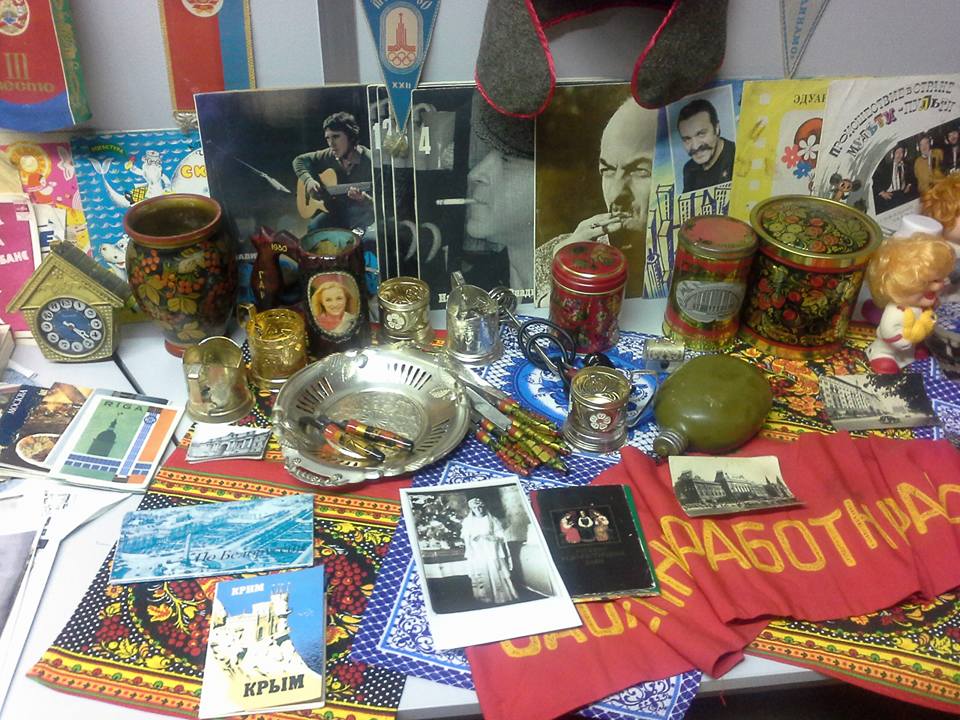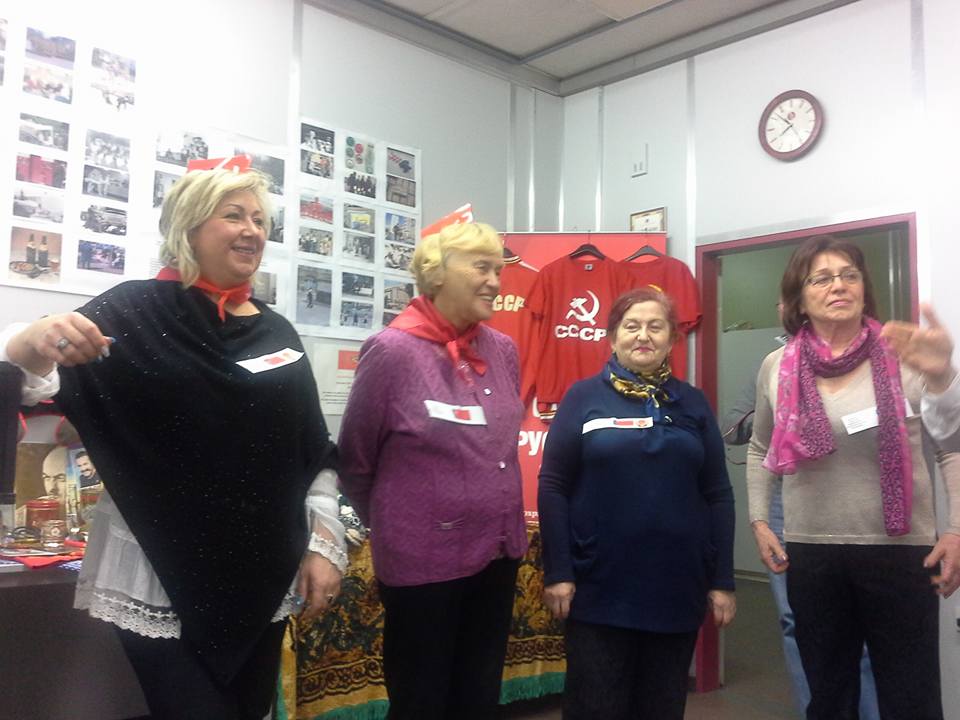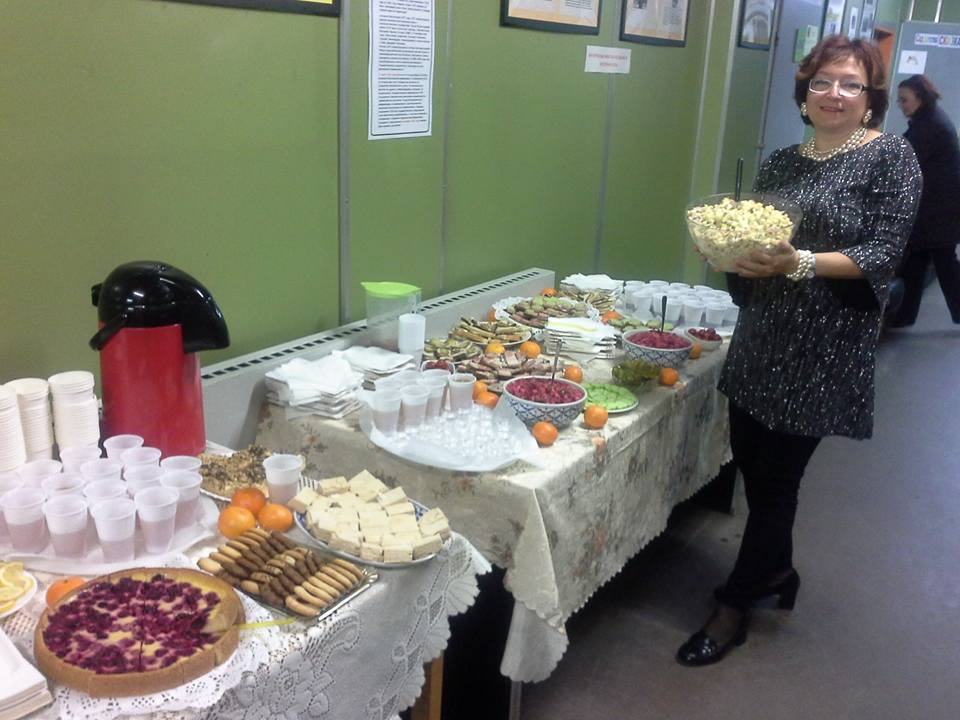25 years after dissolution of the Soviet Union, many people, who were young during the late Soviet times, recall them with pleasure and joy. Russian Centre in Nuremberg also decided to hold such a memorial event, where its guest shared the most exciting experiences of their childhood and youth, listening to hits and eating delicacies of the Soviet times.
25 years ago, on sharply December 8, 1991, the line was drawn at the existence of the great Soviet country. But we - its ex-citizens - are closely bound to it: we grew up here, we studied and married, got our best friends here, we lived next to genious scientists, cosmonauts, writers, poets, musicians, actors and directors. We were surrounded by simple furniture at home, modest variety of technical equipment and personal belongings, but we had an easy attitude to all the daily inconveniencies.

We used to visit noisy demonstrations with pleasure, return tons of waste paper to buy scarce books, subscribe for numerous thick literary journals, collect potatoes and cotton together, go shopping to buy a loaf of bread and a bottle of milk with a net bag.
We used to write postcards for every holiday and send them to cities of the entire giant Soviet Union. We used to watch our favourite movies in cinemas for many times. We bought annual passes to philharmonics and cinemas. We gathered in kitchens and could spend long nights, discussing books, cinemas, reading poems, listening to long recordings and sing to guitar with friends.
We recalled pleasant moments like this at the interactive exhibition event “ABC of the USSR”, which gathered a great amount of our compatriots - current citizens of Nuremberg – at the Nuremberg Russian Centre. Numerous exhibit items provided by regular visitors and friends of the Russian Centre helped us dip into the atmosphere of the USSR. At the exhibition, we saw photographs from thick family albums, books and textbooks, clothes, jewellery, postcards, vases, toys, napkins, statues, jewel-cases, stamps, watches, money, documents, prizes, dishes, instruments, wall carpets and many others. They are all kept in families as they all connected with unforgettable experiences and memories about the years in the Soviet Union.
Before the official part of the event started, every guest had attached to his or her lapel a paper sign of the Soviet republic, which he or she came from, with its name, flag and coat of arms. When everyone gathered at the cinema hall of the Russian Centre, we saw almost the entire map of Soviet Union.
According to a Soviet tradition, our evening began with announcing the agenda and voting for it. The agenda was wide - presentation of interactive exhibition, video trip around the USSR, quizzes, funny competitions, karaoke with songs from Soviet movies, Soviet snack bar and 70-80s disco. All the items of the agenda caused lively discussions and approval - as you can understand, there were no votes "against" or "abstained".
One of our guests Anatoliy Dozortsev (Baku) provided the most unusual exhibition item - an issue of "Baku Worker" dated January 21, 1924, which has an announcement of Vladimir Lenin's death. He also told us about other items, including small books of poems, a DIY school notebook, numerous diplomas and a white linen tablecloth with Olympic emblem - the Dozortsevs gave it to the Russian Centre as a gift.

We recalled all the good things, which happened to us in the Soviet Union and our evening aggregated from different memories. Certainly, we started from Soviet childhood and active social life of Little Octobrists and Pioneers. We admitted a couple of people into Pioneers, who despite of their respectable age remembered the words of the Pioneer Oath by heart. All the fresh Pioneers had their red ties knotted on their necks to the sound of the pioneer hymn and drums.
We also recalled how our parents took us to theatres on weekends and holidays and we knew the difference between opera and ballet from the very childhood, we knew the names of composers and musical performances. Many were students of music schools and ballet studios. The program of the evening included an extract from Petr Chaikovsky's ballet "Dance of the Little Swans", which was brilliantly performed by our guests. Certainly, we also remembered about ridiculous prices for basic foods and, on the other hand, about the permanent commodity deficit and queues to buy a car, a refrigerator, color TV-set or even a carpet. Arkadiy Raikin's unforgettable monologue was the most vivid evidence of these difficult moments of our lives.
Guests answered the questions of our quizzes with pleasure. The greatest knowledge and the most brilliant answers were connected with Soviet TV and movies. We recollected our favourite TV-shows, movies, actors and directors, sang many songs from Soviet movies all together.

As our evening was almost held on the eve of New Year day, we asked our guests to dine. The table was set in traditional Soviet style; it had Russian salad, beetroot salad, sprats, pickled foods, doctor sausage and salo, sweets, gingerbread, chocolate cakes and tangerines. After "Sport Lotto" lottery drawing, guests told funny stories and anecdotes, according to a tradition. We were very pleased to remind people that apart from disadvantages of our Soviet life, we also had many good things we remember, save and use even today.
Musical part of our evening returned our guests to their youth. When Soviet hits of 1970-80s were playing, our guests started singing along and dancing.
Our evening was held in a single burst - guests started straggling off only in the dead of the night. We received warmest acknowledgements and would like to express our gratitude for the time we had together in turn. Our exhibition and evening were not made according to a history of USSR textbook; it was only our personal point of view - just separate accents of our life in the Soviet Union. We think that our life then was interesting and intense.










